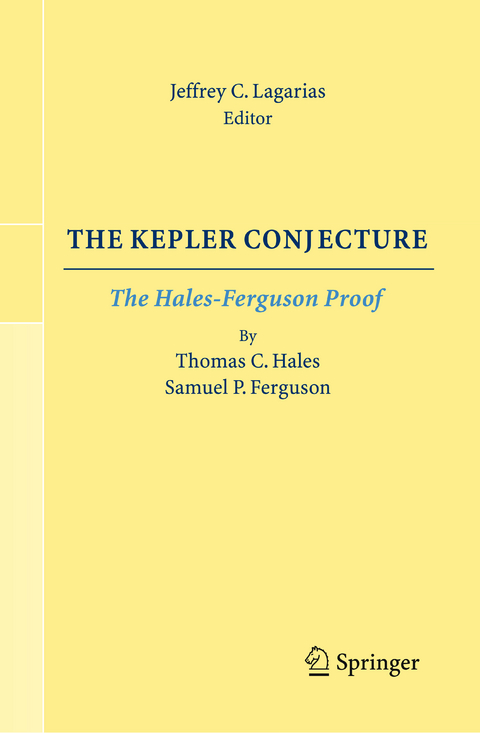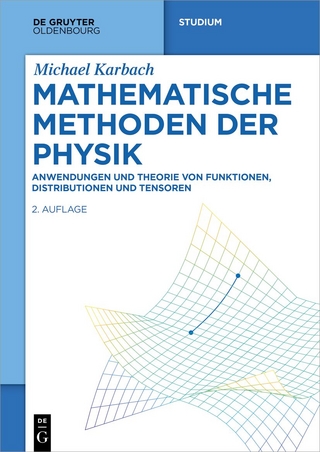The Kepler Conjecture
Springer-Verlag New York Inc.
978-1-4614-1128-4 (ISBN)
This book centers around six papers, presenting the detailed proof of the Kepler conjecture given by Hales and Ferguson, published in 2006 in a special issue of Discrete & Computational Geometry. Further supporting material is also presented: a follow-up paper of Hales et al (2010) revising the proof, and describing progress towards a formal proof of the Kepler conjecture. For historical reasons, this book also includes two early papers of Hales that indicate his original approach to the conjecture.
The editor's two introductory chapters situate the conjecture in a broader historical and mathematical context. These chapters provide a valuable perspective and are a key feature of this work.
Thomas C. Hales, Mellon Professor of Mathematics at the University of Pittsburgh, began his efforts to solve the Kepler Conjecture before 1992. He is a pioneer in the use of computer proof techniques, and he continues work on a formal proof of the Kepler Conjecture as the aim of the Flyspeck Project (F, P and K standing for Formal Proof of Kepler). Samuel P. Ferguson completed his doctorate in 1997 under the direction of Hales at the University of Michigan. In 1995, Ferguson began to work with Hales and made significant contributions to the proof of the Kepler Conjecture. His doctoral work established one crucial case of the proof, which appeared as a singly authored paper in the detailed proof. Jeffrey C. Lagarias, Professor of Mathematics at the University of Michigan, Ann Arbor, was a co-guest editor, with Gábor Fejes-Tóth, of the special issue of Discrete & Computational Geometry that originally published the proof.
Preface.- Part I, Introduction and Survey.- 1 The Kepler Conjecture and Its Proof, by J. C. Lagarias.- 2 Bounds for Local Density of Sphere Packings and the Kepler Conjecture, by J. C. Lagarias.- Part II, Proof of the Kepler Conjecture.- Guest Editor's Foreword.- 3 Historical Overview of the Kepler Conjecture, by T. C. Hales.- 4 A Formulation of the Kepler Conjecture, by T. C. Hales and S. P. Ferguson.- 5 Sphere Packings III. Extremal Cases, by T. C. Hales.- 6 Sphere Packings IV. Detailed Bounds, by T. C. Hales.- 7 Sphere Packings V. Pentahedral Prisms, by S. P. Ferguson.- 8 Sphere Packings VI. Tame Graphs and Linear Programs, by T. C. Hales.- Part III, A Revision to the Proof of the Kepler Conjecture.- 9 A Revision of the Proof of the Kepler Conjecture, by T. C. Hales, J. Harrison, S. McLaughlin, T. Nipkow, S. Obua, and R. Zumkeller.- Part IV, Initial Papers of the Hales Program.- 10 Sphere Packings I, by T. C. Hales.- 11 Sphere Packings II, by T. C. Hales.- Index of Symbols.- Index of Subjects.
| Zusatzinfo | 11 Illustrations, black and white; XIV, 456 p. 11 illus. |
|---|---|
| Verlagsort | New York, NY |
| Sprache | englisch |
| Maße | 155 x 235 mm |
| Themenwelt | Mathematik / Informatik ► Mathematik ► Angewandte Mathematik |
| Mathematik / Informatik ► Mathematik ► Finanz- / Wirtschaftsmathematik | |
| Mathematik / Informatik ► Mathematik ► Geometrie / Topologie | |
| Naturwissenschaften ► Physik / Astronomie | |
| Schlagworte | anchors • Hales-Ferguson partition rule • Hales-Ferguson proof • Kepler conjecture • sphere packings |
| ISBN-10 | 1-4614-1128-9 / 1461411289 |
| ISBN-13 | 978-1-4614-1128-4 / 9781461411284 |
| Zustand | Neuware |
| Haben Sie eine Frage zum Produkt? |
aus dem Bereich




